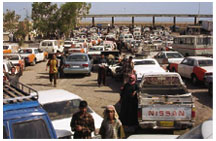
 Photo:
Iraqis line up at a gas station in Fallujah, in a photo taken in May by
Geoffrey Gasperini ’01, who is serving with the U.S. Army.
Photo:
Iraqis line up at a gas station in Fallujah, in a photo taken in May by
Geoffrey Gasperini ’01, who is serving with the U.S. Army.
You may not sense it when walking around the Princeton campus, but as we prepare this issue in late September, there’s a war going on – or, at least, something that’s not quite peace.
While current Princeton students are viewed largely as an apolitical bunch, many Princeton alumni have been personally involved in the war in Iraq and its aftermath. They are fighters and relief workers, journalists and policymakers. Some drop into Iraq for quick assignments and then fly home to safety; others remain there, month after month. Some, like Maj. Gen. David H. Petraeus *87, the commander of the 101st Airborne Division, who has been leading reconstruction efforts in Mosul and surrounding areas, have received national attention for their work. Others remain out of the spotlight.
Several months ago, PAW reached out to alumni serving and working in Iraq, hoping to glimpse, through their eyes, the places and people of Iraq, and the events we read about in daily news accounts. We gave few guidelines, asking only that the alumni contribute short personal reflections, not policy statements. We were delighted by the response.
Back at her law practice after finishing her assignment in the Middle East as a South Carolina Air National Guard pilot, Tally Parham ’92 took the time to write about the death of a comrade’s husband. Joshua Hammer ’79, Newsweek’s Jerusalem bureau chief, recounted his thoughts around the time of the bombing of the U.N.’s Iraq headquarters in August, as did Kevin Henry *81, advocacy director at CARE U.S.A. Michael Viola ’59, a physician whose organization, Medicine for Peace, has been working in Iraq since 1991, recalled his rounds through a pediatric ward filled with malnourished children. There are other stories, told from other perspectives.
No doubt, the alumni and one Princeton lecturer who contributed to this issue have dramatically different views about the wisdom of the war, its aftermath, and about what the next steps should be. But they offer insights into a place, and a conflict, that the rest of us view only at great distance, between the routine matters that make up our days.
Though the range of contributors is wide, some perspectives are missing
here – for example, that of Iraqis affected by the war. We invite
letters from alumni who have their own stories to tell.
![]()
![]()
